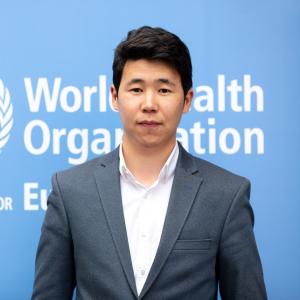EU-WHO programme bolsters COVID-19 response in Kyrgyzstan: strengthening national laboratories
03 February 2022
Bishkek, Kyrgyzstan – Since the start of the pandemic, the EU-WHO programme launched in 2020 trained national epidemiologists, laboratory workers and public health specialists involved in COVID-19 testing. They were upskilled by WHO international experts on PCR, SNP assay, antigen-detecting rapid diagnostic and ELISA tests toward COVID-19.
In the framework of the Programme, the WHO developed a comprehensive training for all public health workers involved in the COVID-19 testing across the country. Online and practical on-site training sessions were organised with SARS-CoV-2 biomaterials, including collection, transportation, processing and preparation of samples. The materials help laboratory workers successfully detect, characterise and track COVID-19 transmission.
In addition, the EU-WHO programme assessed 13 national health facilities across the country with a focus on Quality Management System, Biosafety and Biosecurity, health facilities’ waste management capabilities.
“The spread of COVID-19 has put our national laboratories in Kyrgyzstan to the test. Good laboratory practices, quality control and accurate results are essential in the laboratory testing process, which is a crucial part of our response to COVID-19,” said Alymkadyr Beishenaliev during a joint visit to the Republican Center for Quarantine and Particularly Dangerous Infections. He thanked the WHO and EU Delegation in the Kyrgyz Republic for their continuous technical support and recommendations to scale up national laboratory capacities.
EU Ambassador Eduard Auer stressed, “Testing is critical to control the transmission of the COVID-19 virus effectively. No one is safe until we are all safe, and the EU will continue supporting the Kyrgyz health system and providing vaccines through the global COVAX mechanism. Europeans and Kyrgyz are together in overcoming this global pandemic."
“WHO, in its turn, will continue providing further support to Kyrgyzstan to strengthen emergency preparedness in the field of health care and implementation of international health regulations, which will help the country to respond effectively during emergencies,” highlighted Nazira Artykova, WHO Representative in Kyrgyzstan.
Programme information:
Central Asia COVID-19 Crisis Response Programme (CACCR) is a joint effort of the European Union (EU) and WHO Regional Office for Europe, focusing on Kazakhstan, Kyrgyzstan and Turkmenistan. A 2-year, €3 million regional project to help prevent, detect and respond to the COVID-19 pandemic, and increase country capacities to respond to similar public health threats. It aims to strengthen countries’ public health emergency preparedness, coordination, detection and response; and build the resilience of national health systems. The project is implemented by the WHO Regional Office for Europe and WHO country offices, in close coordination with EU Delegations, national authorities and development partners.



